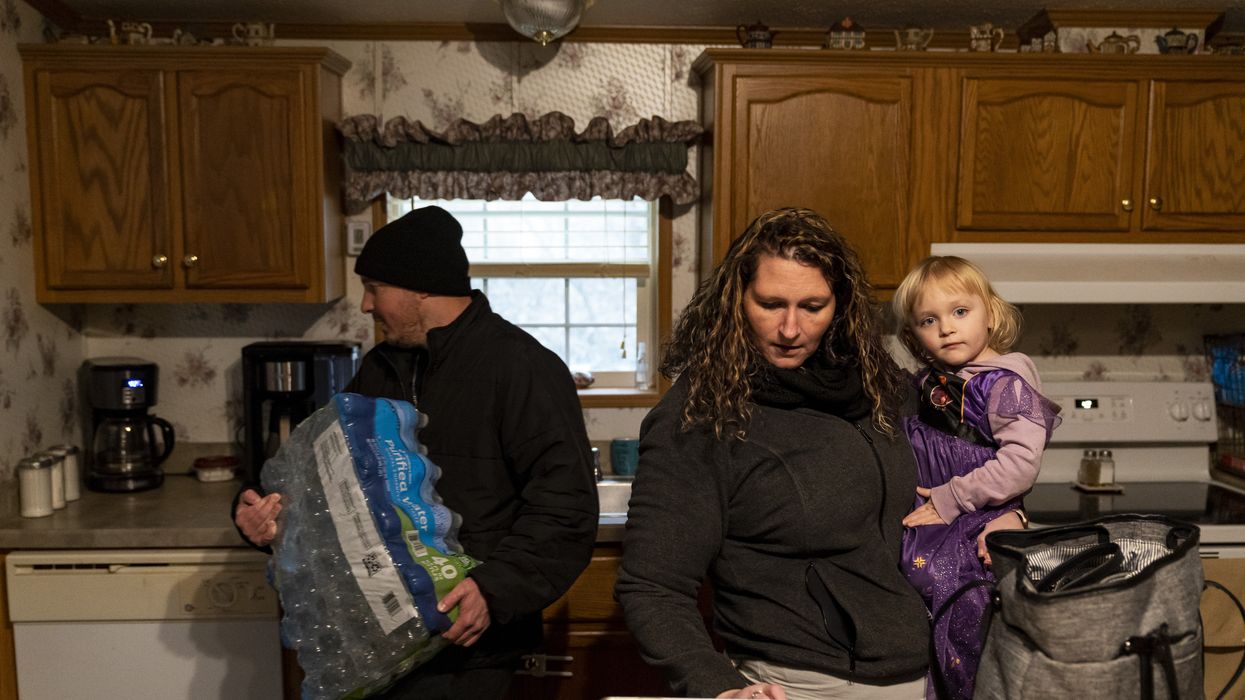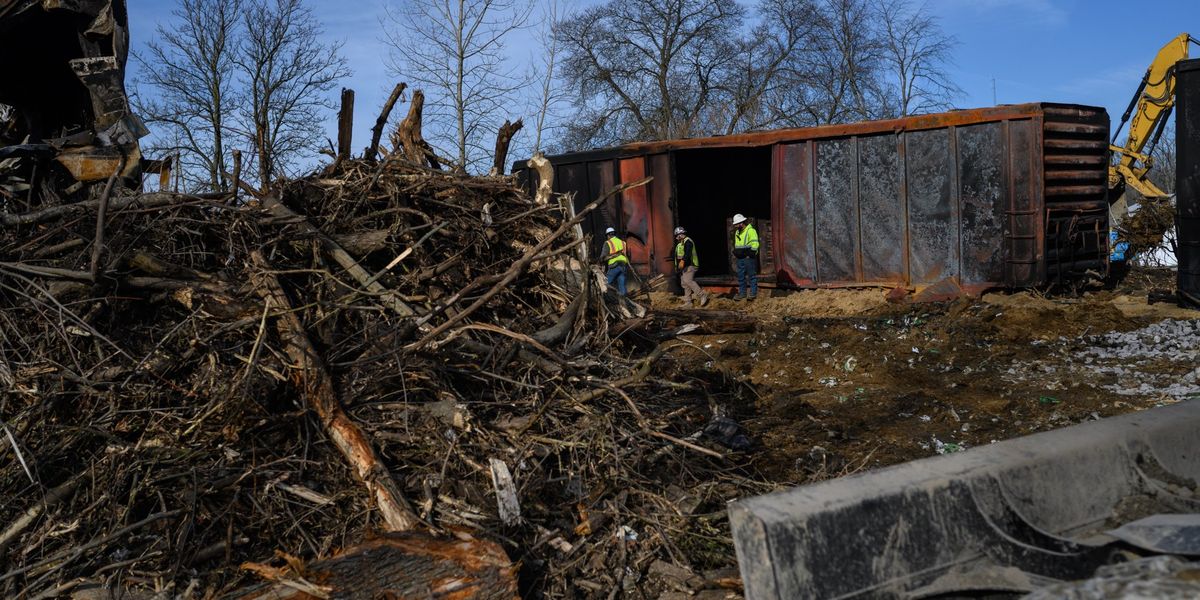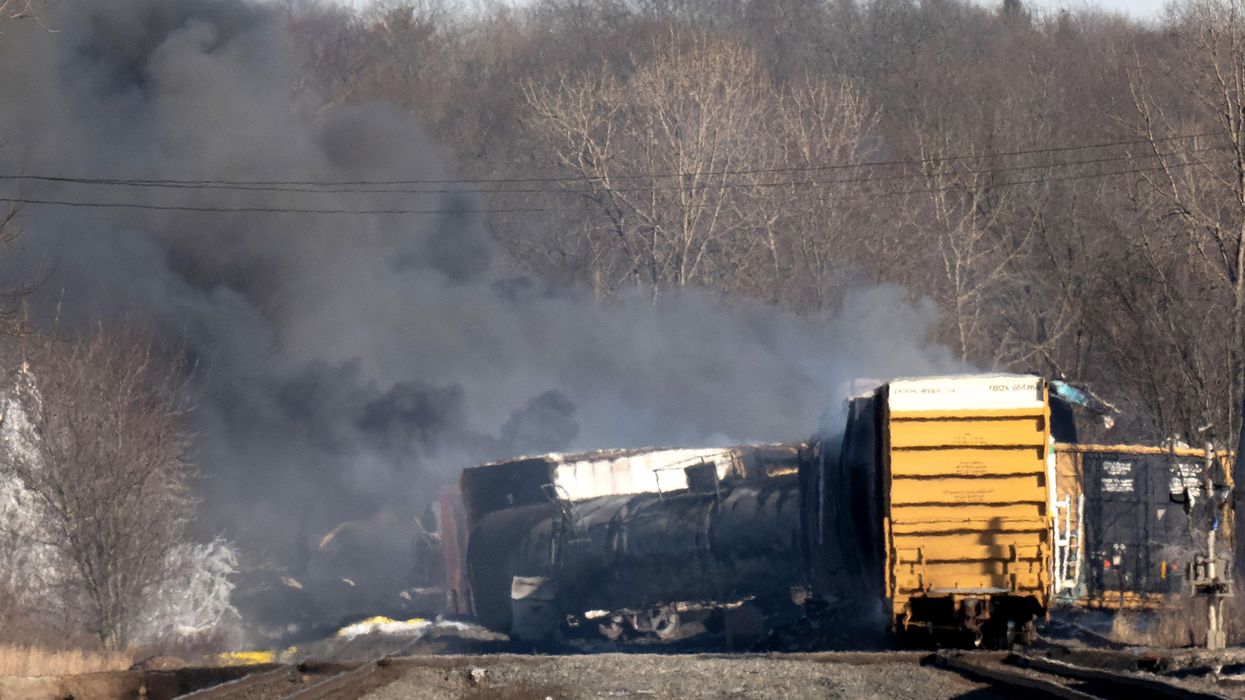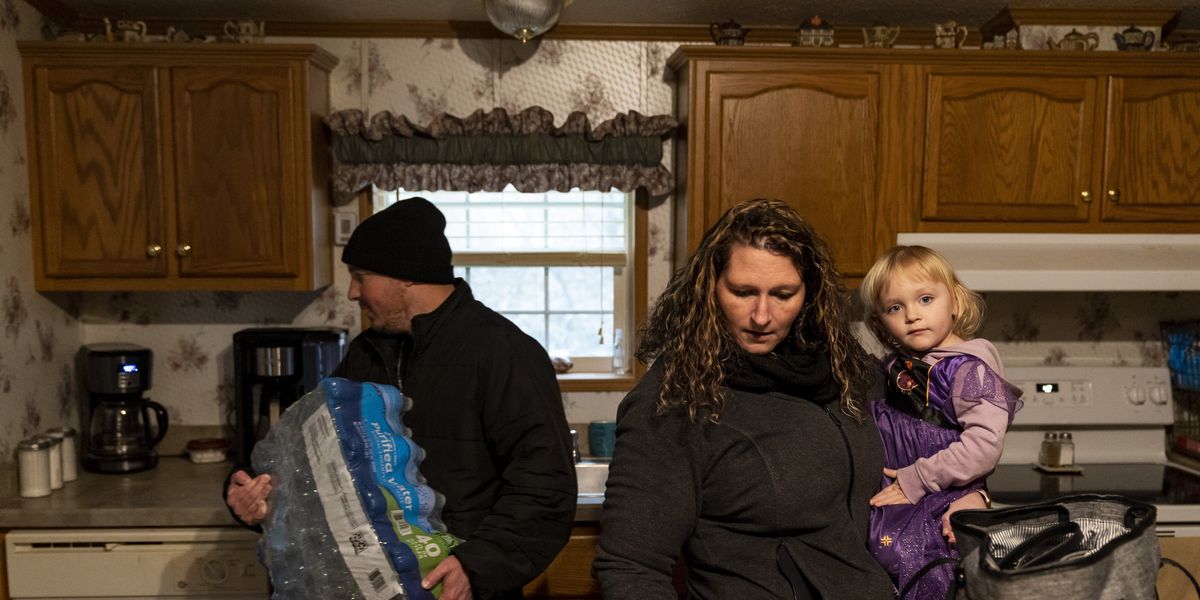
Ahead of former President Donald Trump’s Wednesday visit to East Palestine, Ohio—where a Norfolk Southern-owned train transporting carcinogenic chemicals derailed on February 3, prompting a mass evacuation and release of pollutants—progressive critics highlighted the key role his administration played in making the fiery crash and its toxic aftermath more likely.
During his speech, Trump—considered a leading GOP presidential candidate for 2024 despite spearheading a deadly coup attempt following his 2020 loss—criticized how President Joe Biden’s administration has responded to the environmental and public health disaster unfolding in East Palestine, a poor rural town of about 4,700 people located a few miles west of the Pennsylvania border.
But as critics noted beforehand, the Trump administration’s gutting of train safety rules at the behest of railroad industry lobbyists was instrumental in creating the conditions for the derailment and ensuing chemical spill and burnoff, which has provoked fears of groundwater contamination and air pollution.
“He should be apologizing to that community for his administration rolling back rail regulations,” progressive stalwart Nina Turner, a former Ohio state senator, tweeted prior to Trump’s address.
Philadelphia Inquirer columnist Will Bunch made a similar point in an opinion piece published earlier this week.
“If residents of East Palestine—a modern news desert of downsized or disappeared news sources, which allows misinformation to fester—truly knew the reality, a delegation of townsfolk would likely greet Trump with tiki torches and pitchforks,” Bunch wrote, comparing the former president’s visit to “the tendency of a criminal to return to the scene of his crime.”
Bunch noted that “Trump acted specifically to sabotage a nascent government effort to protect citizens from the growing threat posed by derailments of outdated, poorly equipped, and undermanned freight trains that were increasingly shipping both highly flammable crude oil from the U.S. fracking boom as well as toxic chemicals like the ones that would derail in East Palestine.”
“Trump had been in office for less than a year when he moved to kill the 2015 rule change initiated by the Obama administration that would have required freight trains to upgrade the current braking technology that was developed in the 19th century for state-of-the-art electronic systems,” wrote Bunch, who pointed out that this came after Norfolk Southern and other rail carriers donated more than $6 million to Republican candidates in 2016 and spent millions more on lobbying.
“With the investigation into the East Palestine wreck still in its early phases, it’s not clear if the modern brakes—originally required for installation by 2021—could have prevented the toxic derailment or whether the specific Obama rule would have applied,” Bunch continued. “But experts do believe the new brakes could have mitigated the wreckage—and thus the release of so many hazardous chemicals.”
“The rule reversal wasn’t the only time that Team Trump sided with Big Rail over the forgotten Americans who live on the wrong side of their tracks,” he added. “In 2019, for example, the Trump administration moved to not strengthen but relax regulations on shipping fracked natural gas through communities like East Palestine. The same year, Trump’s White House also killed an Obama-era proposal that would have required two crew members in freight-train locomotives.”
“The Trump approach to the rail industry was to let the companies do what they wanted, which was to avoid regulations, slash jobs, and extract profit.”
Ahead of Trump’s visit, More Perfect Union also argued on social media that the ex-president’s “attempt to portray himself as a friend of the town and as someone who would have stood up to Norfolk Southern… couldn’t be further from the truth.”
As the progressive media outlet observed, the Trump administration “withdrew multiple rail safety recommendations and moved toward a ‘self-regulatory approach’ where rail companies could do as they pleased.”
“It’s no surprise that the Trump years were filled with dangerous deregulation,” More Perfect Union asserted, describing his decision to nominate top rail industry executives to lead the Federal Railroad Administration and the Pipeline and Hazardous Materials Safety Administration as “a prime example of the revolving door between business and government.”
“The Trump approach to the rail industry was to let the companies do what they wanted, which was to avoid regulations, slash jobs, and extract profit,” the outlet continued. “This approach, and rail companies’ greed, has led to over 1,000 derailments each year. Some are massive catastrophes like East Palestine. But every single one is harmful. And if the industry isn’t regulated and forced to change, we’ll soon be seeing more disasters.”
When Trump “pretends to care about rail workers, or the people of East Palestine, we can’t believe him,” More Perfect Union added. “His record tells a very different story, the story of his own role in creating this problem in the first place.”
Even some conservative critics of Trump have questioned the sincerity of his visit.
“It’s clear that it’s a political stunt,” Ray LaHood, a Republican ex-member of Congress who led the U.S. Department of Transportation (DOT) during former President Barack Obama’s first term, told Politico on Wednesday. “If he wants to visit, he’s a citizen. But clearly his regulations and the elimination of them, and no emphasis on safety, is going to be pointed out.”
Sen. Chris Murphy (D-Conn.) wasted little time in doing exactly that, calling the GOP’s indignation “fake” soon after Trump announced his travel plans.
Bunch acknowledged that “it’s beyond hypocritical for Trump to bring his Harold Hill-huckster shtick to East Palestine when residents are still experiencing headaches and breathing foul air from the kind of catastrophe he didn’t lift a finger to stop from the Resolute Desk.”
“But also it’s a bit baffling why Biden or his Transportation Secretary Pete Buttigieg—who seems to be channeling his inner McKinsey & Co. these days—haven’t gone to Ohio,” he argued. “Especially when Trump and any other Republicans hoping to make political hay off of East Palestine’s misery are coming to town empty-handed.”
“None of the anti-Biden critics on this issue have offered a solution, because they can’t,” wrote Bunch. “The only fix for the kind of runaway abuses of modern capitalism that cause these environmental catastrophes is government regulation, aided by empowering worker safety with strong unions—two things that the Trump-led GOP has opposed at every turn.”
Even in the wake of the disaster, Republican lawmakers have refused to demand stronger regulations, as HuffPost reported:
Rep. Bill Johnson (R-Ohio), a vocal Biden critic who represents East Palestine, on Tuesday dismissed immediate calls for stricter rail regulations, saying actions toward accountability will hinge on the findings of a National Transportation Safety Board [NTSB] investigation into the derailment.
“That will dictate whether there are laws, regulations that need to be changed, whether there were rules that were violated,” he said during a news conference in East Palestine. “We don’t know any of that yet, and we won’t know that until NTSB releases its report.”
Hours before Trump spoke, Buttigieg announced that he plans to travel to East Palestine on Thursday. His visit is expected to coincide with the publication of the NTSB’s preliminary report about its ongoing probe into the crash.
“Trump and any other Republicans hoping to make political hay off of East Palestine’s misery are coming to town empty-handed.”
On Tuesday, Buttigieg unveiled DOT’s recommendations for improving the safety of the nation’s rail system, though an inter-union alliance of rail workers immediately criticized the plan as inadequate.
Given the scale of the problems—and in light of the transportation secretary’s ongoing refusal to exercise his authority to reinstate previously gutted rules along with his consideration of an industry-backed proposal to further weaken the regulation of train braking systems—union leaders have called for nationalizing the railways and implementing their proposed solutions.
Turner, for her part, emphasized that she has “been outspoken about the two years the Biden administration had [to] fix these problems.”
“The Trump administration is at fault, as is the Obama administration,” Turner contended, referring to the fact that the latter’s regulations were also watered down in response to industry pressure.
“The Ohio GOP is to blame as well,” she added, echoing recent reporting on Norfolk Southern’s campaign to influence state-level lawmakers and officials. “Failure at every level of government and multiple administrations led to this.”





